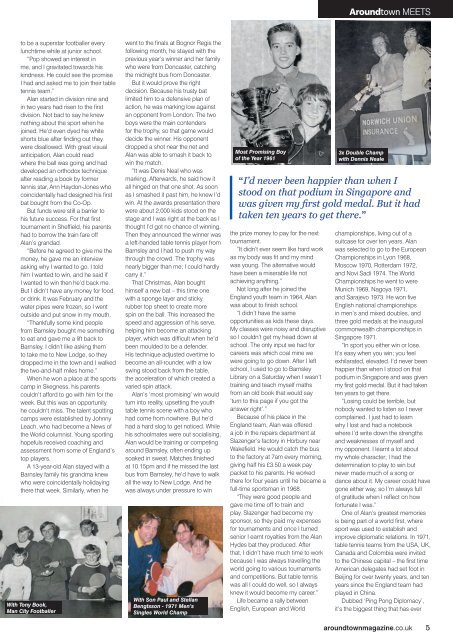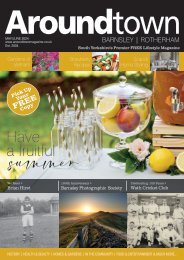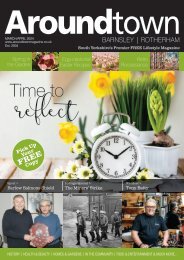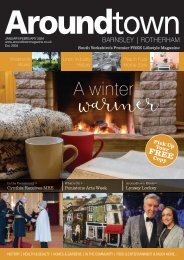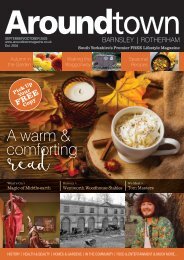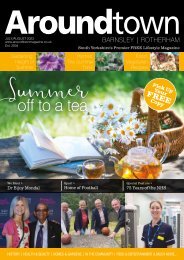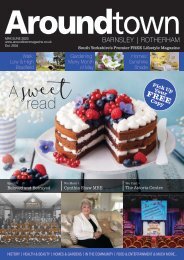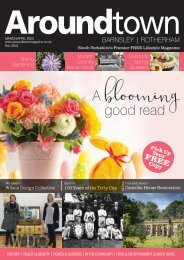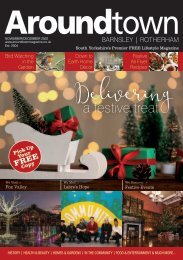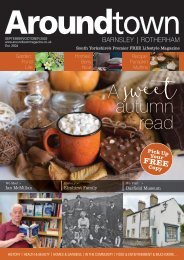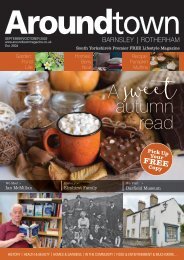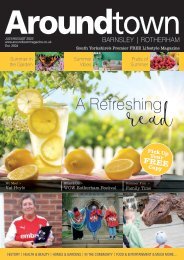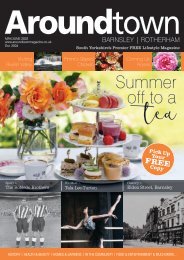Create successful ePaper yourself
Turn your PDF publications into a flip-book with our unique Google optimized e-Paper software.
<strong>Aroundtown</strong> MEETS<br />
to be a superstar footballer every<br />
lunchtime while at junior school.<br />
“Pop showed an interest in<br />
me, and I gravitated towards his<br />
kindness. He could see the promise<br />
I had and asked me to join their table<br />
tennis team.”<br />
Alan started in division nine and<br />
in two years had risen to the first<br />
division. Not bad to say he knew<br />
nothing about the sport when he<br />
joined. He’d even dyed his white<br />
shorts blue after finding out they<br />
were disallowed. With great visual<br />
anticipation, Alan could read<br />
where the ball was going and had<br />
developed an orthodox technique<br />
after reading a book by former<br />
tennis star, Ann Haydon-Jones who<br />
coincidentally had designed his first<br />
bat bought from the Co-Op.<br />
But funds were still a barrier to<br />
his future success. For that first<br />
tournament in Sheffield, his parents<br />
had to borrow the train fare off<br />
Alan’s grandad.<br />
“Before he agreed to give me the<br />
money, he gave me an interview<br />
asking why I wanted to go. I told<br />
him I wanted to win, and he said if<br />
I wanted to win then he’d back me.<br />
But I didn’t have any money for food<br />
or drink. It was February and the<br />
water pipes were frozen, so I went<br />
outside and put snow in my mouth.<br />
“Thankfully some kind people<br />
from Barnsley bought me something<br />
to eat and gave me a lift back to<br />
Barnsley. I didn’t like asking them<br />
to take me to New Lodge, so they<br />
dropped me in the town and I walked<br />
the two-and-half miles home.”<br />
When he won a place at the sports<br />
camp in Skegness, his parents<br />
couldn’t afford to go with him for the<br />
week. But this was an opportunity<br />
he couldn’t miss. The talent spotting<br />
camps were established by Johnny<br />
Leach, who had become a News of<br />
the World columnist. Young sporting<br />
hopefuls received coaching and<br />
assessment from some of England’s<br />
top players.<br />
A 13-year-old Alan stayed with a<br />
Barnsley family his grandma knew<br />
who were coincidentally holidaying<br />
there that week. Similarly, when he<br />
With Tony Book,<br />
Man City Footballer<br />
went to the finals at Bognor Regis the<br />
following month, he stayed with the<br />
previous year’s winner and her family<br />
who were from Doncaster, catching<br />
the midnight bus from Doncaster.<br />
But it would prove the right<br />
decision. Because his trusty bat<br />
limited him to a defensive plan of<br />
action, he was marking low against<br />
an opponent from London. The two<br />
boys were the main contenders<br />
for the trophy, so that game would<br />
decide the winner. His opponent<br />
dropped a shot near the net and<br />
Alan was able to smash it back to<br />
win the match.<br />
“It was Denis Neal who was<br />
marking. Afterwards, he said how it<br />
all hinged on that one shot. As soon<br />
as I smashed it past him, he knew I’d<br />
win. At the awards presentation there<br />
were about 2,000 kids stood on the<br />
stage and I was right at the back as I<br />
thought I’d got no chance of winning.<br />
Then they announced the winner was<br />
a left-handed table tennis player from<br />
Barnsley and I had to push my way<br />
through the crowd. The trophy was<br />
nearly bigger than me; I could hardly<br />
carry it.”<br />
That Christmas, Alan bought<br />
himself a new bat – this time one<br />
with a sponge layer and sticky<br />
rubber top sheet to create more<br />
spin on the ball. This increased the<br />
speed and aggression of his serve,<br />
helping him become an attacking<br />
player, which was difficult when he’d<br />
been moulded to be a defender.<br />
His technique adjusted overtime to<br />
become an all-rounder, with a low<br />
swing stood back from the table,<br />
the acceleration of which created a<br />
varied spin attack.<br />
Alan’s ‘most promising’ win would<br />
turn into reality, upsetting the youth<br />
table tennis scene with a boy who<br />
had come from nowhere. But he’d<br />
had a hard slog to get noticed. While<br />
his schoolmates were out socialising,<br />
Alan would be training or competing<br />
around Barnsley, often ending up<br />
soaked in sweat. Matches finished<br />
at 10.15pm and if he missed the last<br />
bus from Barnsley, he’d have to walk<br />
all the way to New Lodge. And he<br />
was always under pressure to win<br />
With Son Paul and Stellan<br />
Bengtsson - 1971 Men’s<br />
Singles World Champ<br />
Most Promising Boy<br />
of the Year 1961<br />
“I’d never been happier than when I<br />
stood on that podium in Singapore and<br />
was given my first gold medal. But it had<br />
taken ten years to get there.”<br />
the prize money to pay for the next<br />
tournament.<br />
“It didn’t ever seem like hard work<br />
as my body was fit and my mind<br />
was young. The alternative would<br />
have been a miserable life not<br />
achieving anything.”<br />
Not long after he joined the<br />
England youth team in 1964, Alan<br />
was about to finish school.<br />
“I didn’t have the same<br />
opportunities as kids these days.<br />
My classes were noisy and disruptive<br />
so I couldn’t get my head down at<br />
school. The only input we had for<br />
careers was which coal mine we<br />
were going to go down. After I left<br />
school, I used to go to Barnsley<br />
Library on a Saturday when I wasn’t<br />
training and teach myself maths<br />
from an old book that would say<br />
‘turn to this page if you got the<br />
answer right’.”<br />
Because of his place in the<br />
England team, Alan was offered<br />
a job in the repairs department at<br />
Slazenger’s factory in Horbury near<br />
Wakefield. He would catch the bus<br />
to the factory at 7am every morning,<br />
giving half his £3.50 a week pay<br />
packet to his parents. He worked<br />
there for four years until he became a<br />
full-time sportsman in 1968.<br />
“They were good people and<br />
gave me time off to train and<br />
play. Slazenger had become my<br />
sponsor, so they paid my expenses<br />
for tournaments and once I turned<br />
senior I earnt royalties from the Alan<br />
Hydes bat they produced. After<br />
that, I didn’t have much time to work<br />
because I was always travelling the<br />
world going to various tournaments<br />
and competitions. But table tennis<br />
was all I could do well, so I always<br />
knew it would become my career.”<br />
Life became a rally between<br />
English, European and World<br />
3x Double Champ<br />
with Dennis Neale<br />
championships, living out of a<br />
suitcase for over ten years. Alan<br />
was selected to go to the European<br />
Championships in Lyon 1968,<br />
Moscow 1970, Rotterdam 1972,<br />
and Novi Sadi 1974. The World<br />
Championships he went to were<br />
Munich 1969, Nagoya 1971,<br />
and Sarajevo 1973. He won five<br />
English national championships<br />
in men’s and mixed doubles, and<br />
three gold medals at the inaugural<br />
commonwealth championships in<br />
Singapore 1971.<br />
“In sport you either win or lose.<br />
It’s easy when you win; you feel<br />
exhilarated, elevated. I’d never been<br />
happier than when I stood on that<br />
podium in Singapore and was given<br />
my first gold medal. But it had taken<br />
ten years to get there.<br />
“Losing could be terrible, but<br />
nobody wanted to listen so I never<br />
complained. I just had to learn<br />
why I lost and had a notebook<br />
where I’d write down the strengths<br />
and weaknesses of myself and<br />
my opponent. I learnt a lot about<br />
my whole character; I had the<br />
determination to play to win but<br />
never made much of a song or<br />
dance about it. My career could have<br />
gone either way, so I’m always full<br />
of gratitude when I reflect on how<br />
fortunate I was.”<br />
One of Alan’s greatest memories<br />
is being part of a world first, where<br />
sport was used to establish and<br />
improve diplomatic relations. In 1971,<br />
table tennis teams from the USA, UK,<br />
Canada and Colombia were invited<br />
to the Chinese capital – the first time<br />
American delegates had set foot in<br />
Beijing for over twenty years, and ten<br />
years since the England team had<br />
played in China.<br />
Dubbed ‘Ping Pong Diplomacy’,<br />
it’s the biggest thing that has ever<br />
aroundtownmagazine.co.uk 5


